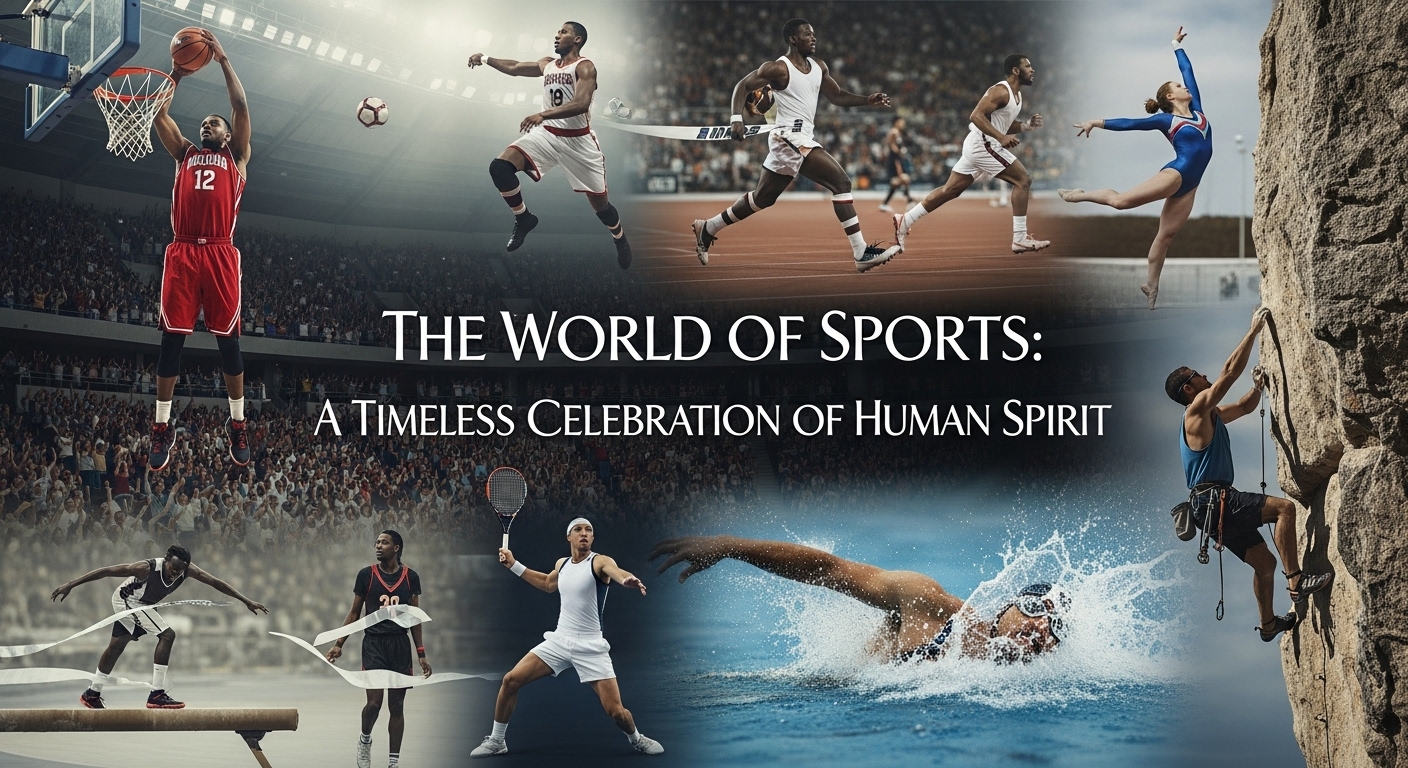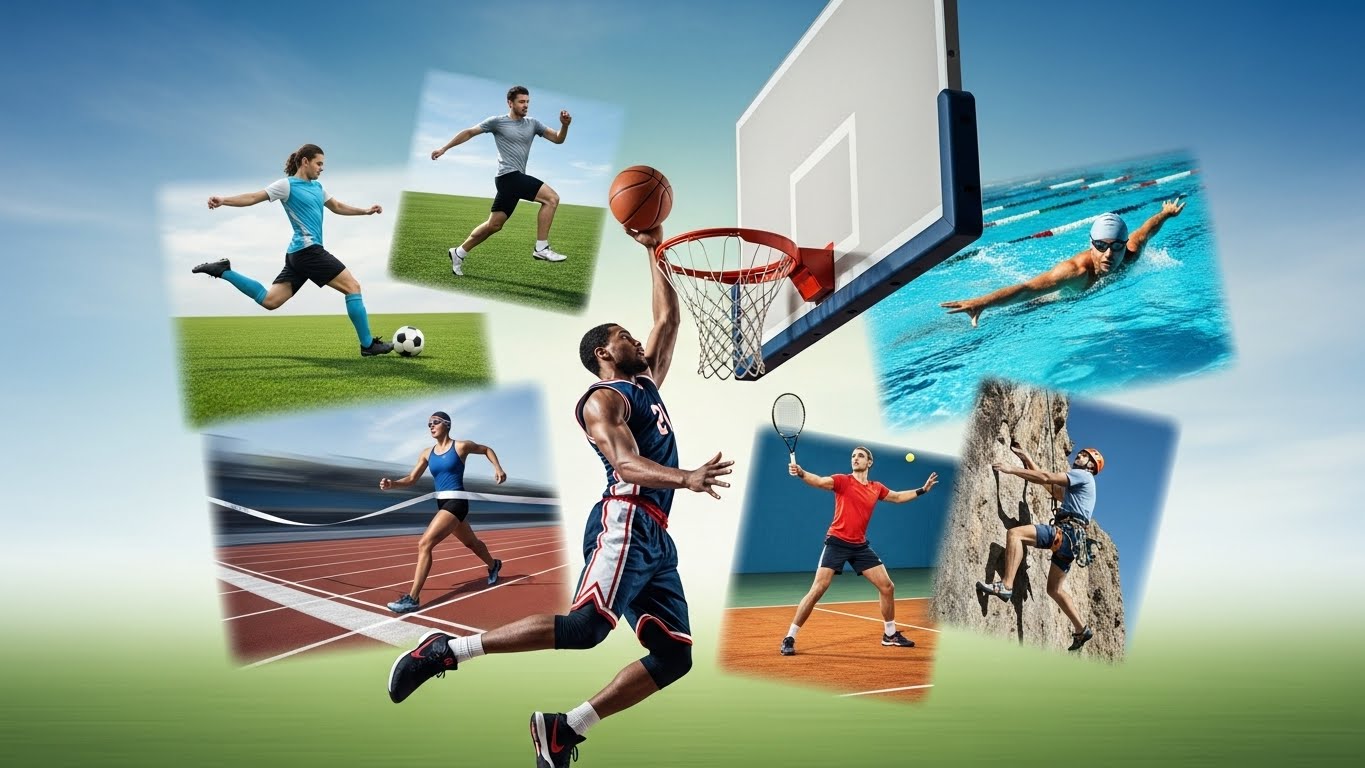Sports have been an integral part of human civilization since ancient times. From the ancient Olympic Games in Greece to modern-day international tournaments, sports have always held a significant place in society. Beyond entertainment, sports influence health, culture, society, and even the economy. This blog explores the multifaceted world of sports, diving into its history, types, physical and mental benefits, societal impact, and the role it plays in shaping character and community.
The History of Sports
The history of sports dates back thousands of years. Ancient civilizations used sports not only for physical exercise but also for ceremonial purposes and military training. For instance, in ancient Greece, sports like wrestling, running, and chariot racing were integral to religious festivals. The Olympic Games, which began in 776 BCE, were a celebration of athleticism and a tribute to the gods. Similarly, ancient China, Egypt, and Mesopotamia practiced various forms of athletic contests that were both recreational and ritualistic.
During the medieval period, sports evolved in Europe with activities like jousting, archery, and hunting becoming popular among the nobility. With the industrial revolution, sports became more organized and structured. The introduction of rules, governing bodies, and international competitions marked the beginning of modern sports as we know them today. The evolution of sports reflects societal progress and the human desire for competition, entertainment, and physical fitness.
Types of Sports
Sports can be broadly classified into several categories based on their nature, rules, and physical demands. Each type of sport offers unique challenges and benefits.
1. Team Sports
Team sports involve groups of players working together to achieve a common goal. These sports emphasize collaboration, strategy, and communication. Popular examples include:
- Football (Soccer): Known as the world’s most popular sport, football combines skill, strategy, and endurance.
- Basketball: A fast-paced sport that requires agility, coordination, and teamwork.
- Cricket: A game of strategy, skill, and patience, especially popular in countries like India, England, and Australia.
- Volleyball: A sport that relies heavily on reflexes, timing, and teamwork.
2. Individual Sports
Individual sports focus on personal skill, discipline, and determination. They often emphasize personal growth and mastery. Examples include:
- Tennis: Requires precision, strategy, and physical endurance.
- Athletics: Encompasses running, jumping, and throwing events, testing speed, strength, and stamina.
- Swimming: Enhances cardiovascular fitness and muscle strength.
- Gymnastics: Focuses on flexibility, balance, and coordination.
3. Adventure and Extreme Sports
Adventure sports are designed to challenge the limits of human endurance and courage. These sports often involve risks, requiring mental and physical toughness. Popular examples include:
- Rock Climbing: Tests strength, strategy, and mental focus.
- Paragliding: Combines adventure with the thrill of flying.
- Mountain Biking: Demands endurance, balance, and navigation skills.
- Skydiving: Challenges fear and promotes adrenaline rush.
4. Mind and Precision Sports
These sports focus more on concentration, strategy, and precision rather than raw physical power. Examples include:
- Chess: Though not physically demanding, chess is recognized as a sport for its strategic depth and competitive nature.
- Archery: Requires focus, steady hands, and patience.
- Billiards/Pool: Enhances focus, precision, and problem-solving skills.
Physical Benefits of Sports
Participation in sports offers numerous physical benefits that contribute to overall health and well-being. These benefits extend beyond the immediate improvement of fitness and encompass long-term health advantages.
1. Improves Cardiovascular Health
Engaging in sports like running, swimming, or football strengthens the heart and improves blood circulation. This reduces the risk of cardiovascular diseases, high blood pressure, and strokes.
2. Enhances Strength and Flexibility
Sports activities help in building muscular strength and flexibility. For instance, gymnastics and yoga-based sports improve balance, agility, and muscle tone.
3. Aids in Weight Management
Regular participation in sports helps in burning calories, controlling body fat, and maintaining a healthy weight. This is particularly beneficial in combating obesity-related health issues.
4. Boosts Immunity
Active participation in physical activities strengthens the immune system, making the body more resilient to illnesses and infections.
5. Promotes Healthy Sleep Patterns
Engaging in sports helps regulate sleep cycles by reducing stress and fatigue. Athletes often experience deeper and more restful sleep due to physical exertion.
Mental and Psychological Benefits of Sports
Sports do not just build physical strength; they are equally important for mental and emotional well-being.
1. Reduces Stress and Anxiety
Physical activity during sports triggers the release of endorphins, the “feel-good” hormones, which help in reducing stress and anxiety levels.
2. Improves Concentration and Cognitive Skills
Sports like chess, tennis, and football require strategic thinking, focus, and quick decision-making, which enhance mental agility and cognitive abilities.
3. Builds Self-Discipline
Regular training and practice instill discipline, time management, and a sense of responsibility in individuals.
4. Boosts Confidence and Self-Esteem
Achieving goals and improving performance in sports increases confidence and promotes a positive self-image.
5. Enhances Emotional Resilience
Sports teach individuals to handle success and failure gracefully. Athletes learn to cope with challenges, setbacks, and pressure effectively.
Social and Cultural Impact of Sports
Sports play a crucial role in shaping societies and cultures. They are a unifying force that transcends geographical, linguistic, and cultural barriers.
1. Fosters Community and Team Spirit
Sports bring people together, fostering teamwork, cooperation, and community engagement. Local sports clubs, tournaments, and leagues create a sense of belonging and camaraderie.
2. Promotes Cultural Exchange
International sports events, such as the Olympics and World Cup, provide a platform for cultural exchange and mutual respect among nations.
3. Encourages Gender Equality
The inclusion of women in sports has challenged traditional stereotypes, promoting equality and inspiring younger generations to pursue their passion.
4. Strengthens National Identity
Sports victories often evoke a sense of pride and unity within a nation. Iconic athletes become national heroes, inspiring millions and elevating the country’s global image.
5. Drives Social Change
Sports initiatives are increasingly being used to promote social causes, raise awareness, and address issues like poverty, education, and health.
Sports and Education
Integrating sports into education has proven to be highly beneficial for students. Physical education programs enhance academic performance, social skills, and overall development.
1. Improves Academic Performance
Regular physical activity improves blood flow to the brain, enhancing concentration, memory, and learning capabilities. Students engaged in sports often perform better academically.
2. Develops Leadership and Teamwork Skills
Participation in team sports teaches leadership, collaboration, and problem-solving skills that are valuable in professional and personal life.
3. Encourages Healthy Lifestyle Habits
Students involved in sports are more likely to adopt healthy lifestyle habits, such as regular exercise, proper nutrition, and time management.
4. Provides Career Opportunities
Sports education opens doors to careers in coaching, sports management, fitness training, and professional athletics.
The Economic Impact of Sports
Sports are not only a source of entertainment and health benefits but also a significant contributor to the global economy.
1. Employment Generation
Sports industries create millions of jobs, including athletes, coaches, referees, event managers, and marketing professionals.
2. Boosts Tourism
Major sporting events attract international tourists, generating revenue for local economies and promoting cultural exchange.
3. Sponsorship and Media Revenue
Sports attract significant sponsorships and media coverage, creating business opportunities and financial growth for teams, leagues, and athletes.
4. Infrastructure Development
The need for sports facilities drives infrastructure development, including stadiums, training centers, and recreational parks.
Technology in Sports
Modern technology has revolutionized sports in numerous ways, enhancing performance, safety, and entertainment value.
1. Performance Analytics
Advanced analytics help athletes monitor performance, identify strengths and weaknesses, and improve strategies.
2. Injury Prevention and Rehabilitation
Wearable technology and medical advancements assist in injury prevention, early detection, and effective rehabilitation.
3. Enhanced Viewing Experience
Technology has transformed how audiences watch sports, from high-definition broadcasts to virtual reality experiences.
4. Fair Play and Accuracy
Technological innovations like VAR (Video Assistant Referee) in football or Hawk-Eye in tennis ensure fairness and accuracy in competitive sports.
Sports and Health Challenges
While sports offer numerous benefits, they also pose certain health challenges that need attention.
1. Risk of Injuries
Athletes are prone to injuries such as sprains, fractures, and concussions. Proper training, equipment, and medical support are essential to minimize risks.
2. Mental Pressure
Competitive sports can lead to stress, anxiety, and burnout if not managed properly. Psychological support is crucial for athletes’ mental well-being.
3. Overtraining and Fatigue
Excessive training without proper rest can lead to fatigue, decreased performance, and long-term health issues.
4. Doping and Unethical Practices
Some athletes resort to performance-enhancing drugs, which can harm health and compromise the integrity of sports.
Conclusion
Sports are much more than games or physical activity; they are a reflection of human spirit, determination, and collaboration. From enhancing physical and mental health to fostering social cohesion and economic growth, sports play a vital role in modern society. By promoting active participation, fair play, and inclusivity, sports can continue to inspire individuals and communities worldwide. Whether you are an athlete, a spectator, or someone exploring the world of sports, embracing its values and benefits can lead to a healthier, more fulfilling, and connected life.



